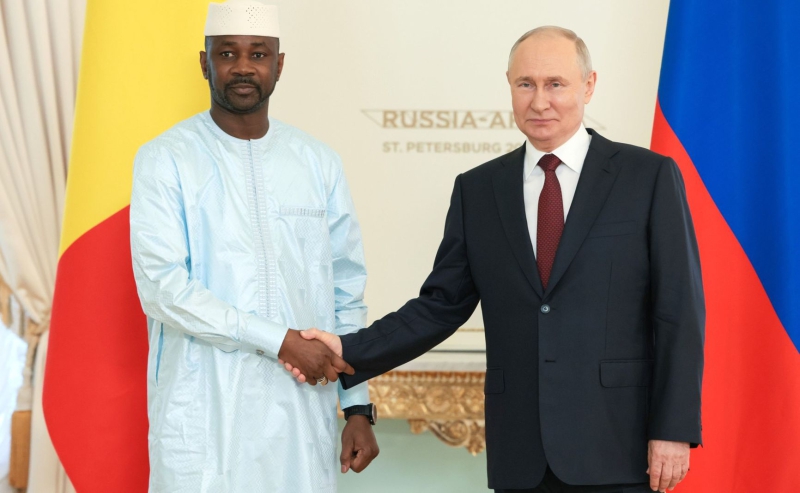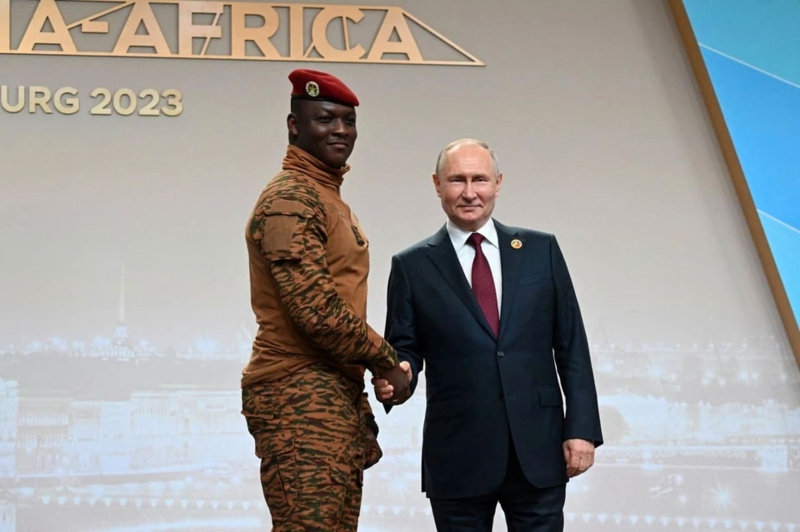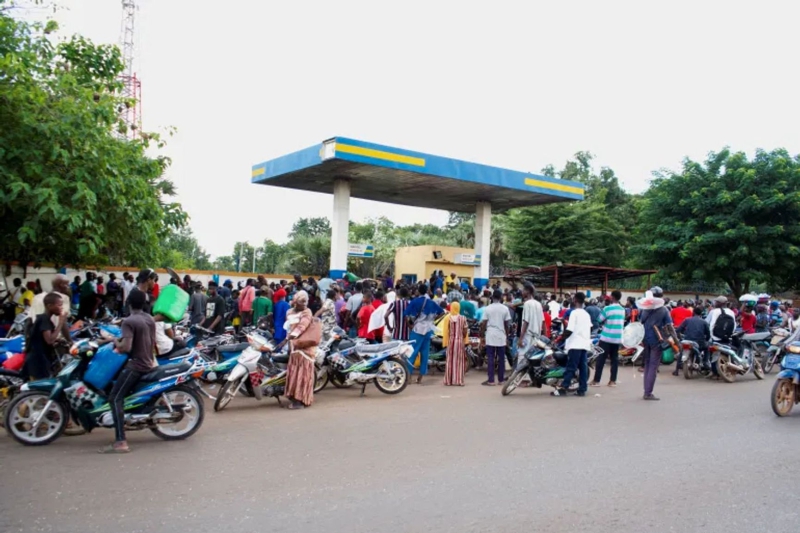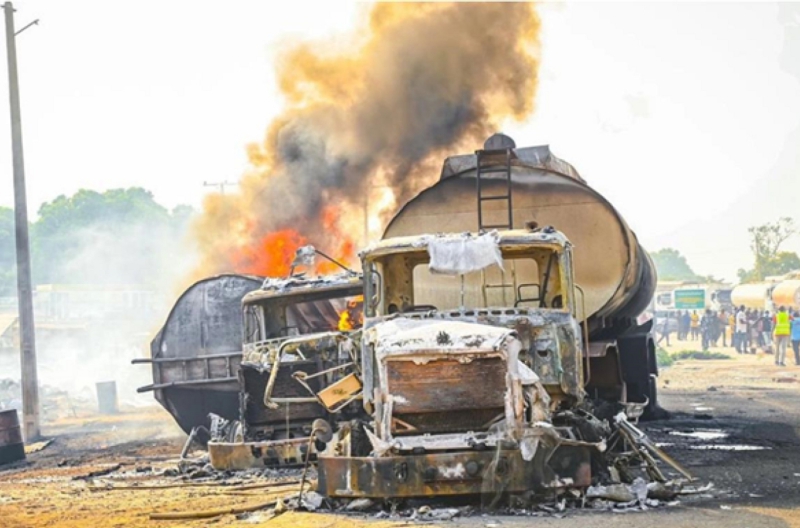More than 40 fuel tankers were burned in Mali when militants attacked the convoy
The military junta in Mali, heavily backed by Russian mercenaries, is on the verge of losing power. Al-Qaeda-affiliated jihadists, operating in a Mad Max style, have effectively cut the capital, Bamako, off from the rest of the country by blocking deliveries of fuel and other essential goods. If Mali’s main city falls, Al-Qaeda in Africa will be significantly strengthened, gaining control over gold mines and other mineral resources currently held by a government of questionable legitimacy. Russia’s influence, in turn, will drop sharply after its failure to protect its ally, which remains in power — for now.
In the summer of 2023, at the Russia–Africa summit in St. Petersburg, Vladimir Putin justified Russia’s attack on Ukraine by claiming that the authorities in Kyiv were illegitimate, having come to power “as a result of a coup.”
Putin may not have fully grasped the absurdity of the situation in which he found himself — portraying the democratically elected Volodymyr Zelensky as a usurper to an audience that included people who had literally come to power through a coup. At least four such leaders attended the summit: Azali Assoumani of Comoros, Faustin-Archange Touadéra of the Central African Republic, Burkina Faso’s Ibrahim Traoré, and Mali’s Assimi Goïta.
The Tuareg are a people of the Sahara and Sahel who speak a Berber language. They live across several countries, including Mali, Morocco, and Western Sahara. Some of them are striving to establish their national state in these territories.

While Assoumani at least nominally legitimized himself through partially fair elections, and although Touadéra was formally unconnected to the coup that toppled his predecessor, Goïta is a textbook putschist — a man who rose to power in Mali through not one, but two coups.
After the first coup in 2020, Goïta became vice president in a government formed by a military junta led by Colonel Bah Ndaw following the ouster of President Ibrahim Keïta and his cabinet. After the second coup, which occurred only a few months later, Goïta placed Bah Ndaw under house arrest and declared himself Mali’s new president — without any elections or other even quasi-democratic procedures.
The Malian's questionable legitimacy did not faze his Russian summit host. On the contrary, Goïta's lack of a popular mandate, his mistrust of his own armed forces (which had easily been turned against Colonel Bah Ndaw shortly after bringing him to power), and sanctions imposed by the European Union, the United Kingdom, and the United States in condemnation of the coup, all made Goïta an ideal partner for the Kremlin, which was ready to provide him with weapons, money, diplomatic backing, and even troops in exchange for natural resources.
The Tuareg are a people of the Sahara and Sahel who speak a Berber language. They live across several countries, including Mali, Morocco, and Western Sahara. Some of them are striving to establish their national state in these territories.

Mali is one of the continent’s leaders when it comes to deposits of gold and other minerals. In addition, the country belongs to a strategically crucial region in Africa, bordering both Arab Algeria and a whole array of Sub-Saharan African states. For centuries, Mali’s resources and strategic location have attracted all sorts of conquerors, empire-builders, and opportunists looking to profit from the illicit extraction of precious metals.
In the recent decades, the list of contenders vying for control over Mali’s wealth came to feature jihadists. Exploiting the power vacuum after yet another coup in the spring of 2012, several Al-Qaeda–linked groups, supported by ethnic Tuareg separatists, launched offensives on a number of the country’s major cities. Only foreign intervention halted the conversion of Mali into an Al-Qaeda colony, but the jihadist forces were not completely defeated.
In early 2013, a French military contingent arrived in Mali at the government's request, quickly becoming embroiled in an endless war against a formidable opponent. Using airpower, armored vehicles, and daring special forces raids on enemy forward positions, the French slowed the advance of jihadists and their occasional Tuareg allies, but defeating the enemy and liberating occupied territory proved far more difficult.
In addition, Al-Qaeda, along with groups that had pledged allegiance to the region’s even more dangerous ISIS franchise, began carrying out attacks deep in Mali’s rear. By the early 2020s, the civilian government, installed under French pressure, controlled only about one-third of the country. It was helpless against mass casualty attacks and increasingly appeared as a weak group of officials holding power solely thanks to the presence of foreign troops.
Protests demanding the resignation of the discredited government erupted across the country, quickly escalating into mass unrest. After all, Bah Ndaw and his junta had not emerged out of nowhere: they skillfully channeled the growing discontent within the army against officials who had failed to restore order, convincing officers that they could govern the country far more effectively. The conflict between the usurper colonel and Goïta was provoked by the latter’s desire to replace the French with the Russians when it came to choosing Mali’s main foreign ally.
It seems likely that the future attendee of Putin’s geopolitical lectures had made some arrangements with Moscow even before carrying out the second coup, which moved him from the vice-presidency to the presidency. At the very least, one of Goïta’s first decisions as head of state was to end cooperation with the French and invite Russian Wagner Group mercenaries into Mali. Soon after, UN peacekeepers also withdrew from the country, leaving the Russian mercenaries as the only foreign force present.
The Tuareg are a people of the Sahara and Sahel who speak a Berber language. They live across several countries, including Mali, Morocco, and Western Sahara. Some of them are striving to establish their national state in these territories.
Goïta appears to have made arrangements with Moscow regarding Mali even before carrying out the second coup
From the perspective of a putschist who had seized power by force, the decision initially seemed sound. The Russians cared only about money and natural resources, while the French imposed political demands and pressured the junta to hold fair elections and transfer power to civilians.
According to leaked information, the Malian government paid the Russians upwards of $10 million a month — for setting up military bases, sending roughly 2,000 mercenaries to engage in combat against jihadists, training local soldiers, and protecting Goïta and his entourage. However, U.S. Africa Command concluded that money was not the only consideration: the Wagner Group, and by extension the Kremlin, also gained access to Mali’s resources, mainly gold, uranium, and lithium.
As in Syria and Ukraine, the Wagner Group's Mali presence was marked by numerous war crimes — committed against enemies, civilians, and even Malian soldiers, who were ostensibly on the same side as the Russians. According to one account, 30 soldiers and officers of the Malian armed forces who were arrested in the summer of 2025 had turned against the ruling regime due at least in part to the abuse they suffered at the hands of Moscow’s forces.
By the time the conspirators were arrested, nearly all of the Russian mercenaries were no longer officially part of the Wagner Group, which had fallen out of favor with the Kremlin after Yevgeny Prigozhin’s failed drive to Moscow in June 2023. The fighters had been transferred to the newly-formed African Corps of the Russian Ministry of Defense. However, the change in name and command did not alter the reality: they were still mercenaries whose services the Kremlin was selling in exchange for securing as many of Mali’s resources as possible. But the mission did not go as smoothly as planned.
According to researchers from The Sentry, Goïta was never in a hurry to hand over mining concessions to companies with Russian ownership or affiliations. The three largest Russian-owned companies in Mali, set up specifically to secure mineral extraction contracts, ended up empty-handed, losing out to local firms. Goïta’s reluctance to offer up all of the country's uranium and gold to Russia is understandable: a country cut off from global markets by sanctions and war has no other way to fill its budget than by selling its natural riches.
The Tuareg are a people of the Sahara and Sahel who speak a Berber language. They live across several countries, including Mali, Morocco, and Western Sahara. Some of them are striving to establish their national state in these territories.
Goïta was never in a hurry to hand over mining concessions to companies with Russian ownership or affiliations
Such treatment of a strategic ally could not have caused anything but irritation in the Kremlin. To convey the message, Russia simply halted the offensive operations of its African Corps. Eventually, the parties reached a compromise by launching the construction of Mali’s first gold refining plant, with 62% of the assets owned by the Malian government and the remaining 38% by the Russians.
The deal was ironed out at a high-level meeting in Moscow during Goïta's visit in the summer of 2025. The plant is expected to have a capacity of around 200 tons of gold per year, which corresponds to a market value of more than $15 billion. However, the completion of the plant, the Russian presence in Mali, and the future of the coup-installed president himself all remain highly uncertain.
Signs of trouble ahead for the junta were already visible a year ago, when a jihadist alliance led by Jama’at Nusrat al-Islam wal-Muslimin launched an offensive that began to encircle Malian army garrisons defending Bamako and the previously peaceful southern part of the country, which holds the mineral deposits coveted by the Kremlin.
In September 2024, jihadists struck directly at the capital, catching the army off guard by attacking Bamako’s airport and the city garrison’s barracks. The main rebel forces dispersed across villages and small towns surrounding the city. Army raids on suspected jihadist positions proved completely ineffective.
Rural residents refused to hand over rebels to the army, and in response to military violence, many sided with Al-Qaeda and its allies. To offer some protection against attacks by militants, the Malian authorities significantly restricted fuel supplies to rural areas in July 2025.
The idea was that without fuel, jihadists would be unable to pursue their favorite and most effective tactic: raids against army units and infrastructure using motorcycles and gun trucks — pickups fitted with machine guns in their beds. But the gamble did not pay off.
Instead, mobile groups on bikes and pickups began hunting fuel tankers, especially those headed for Bamako. By September, Al-Qaeda and its allies controlled all roads leading to the capital, intercepting or outright destroying the lion’s share of gasoline and diesel bound for Bamako. Only rare tanker convoys, escorted by the military, manage to reach the city — Mad-Max style.
Global media openly describe the situation in Mali’s capital as a siege. In mid-October, a liter of gasoline there cost around $25. By the end of the month, it had risen to over $130 — more than the average monthly salary. As fuel prices soared, the cost of everything else, including food, also skyrocketed. The U.S. and European countries evacuated their diplomats from Mali and urged their citizens to leave immediately, preferably by plane while flights were still operating, since all land routes were controlled by Al-Qaeda.
The Tuareg are a people of the Sahara and Sahel who speak a Berber language. They live across several countries, including Mali, Morocco, and Western Sahara. Some of them are striving to establish their national state in these territories.
The price of a liter of fuel in Bamako exceeded the average monthly salary
Meanwhile, the jihadists are openly calling on Malians to rise up against the junta, denouncing its members as “puppets of the West.” Storming the capital — a four-million-strong city — is beyond the capabilities of the rebels, whose total numbers likely do not exceed 6,000. Instead, they are pursuing asymmetric tactics, sowing chaos and panic in the enemy’s rear, with intermittent success.
For example, the authorities managed to win over residents of several villages that had sheltered militants by promising to lower taxes and halt army raids in exchange for a pledge not to help the jihadists with the blockade of Bamako. But such tactical successes do nothing to resolve the broader problem: the government’s inability to control anything beyond the main city and a handful of gold mines. Instead of seeking effective ways to end the blockade, the junta is preoccupied with finding people to blame for its onset.
The Tuareg are a people of the Sahara and Sahel who speak a Berber language. They live across several countries, including Mali, Morocco, and Western Sahara. Some of them are striving to establish their national state in these territories.

The regime’s collapse, or even its significant weakening, would offer Al‑Qaeda a chance to seize the gold mines and mineral deposits currently controlled by Goïta’s government and its Russian allies. It appears that securing these resources is one of Al‑Qaeda’s primary objectives in this conflict.
Jihadist groups are gradually turning Mali into a Saharan analogue of Somalia, where the central government controls almost nothing beyond Mogadishu’s government quarter and various radical groups survive by exploiting national resources.
In addition, Malian jihadists are already operating beyond the country’s borders. At the end of October, they attacked soldiers in Nigeria, killing one. Al‑Qaeda is taking advantage of the chaos, profiting from smuggling, the sale of seized resources, and even the kidnapping of foreign nationals for ransom.
If the military junta fails to quickly and effectively lift the siege of Bamako, Mali could face another coup and the rise to power of players willing to negotiate with Al‑Qaeda. It may attempt to do this by exchanging some of the state’s resources in exchange for an end to the blockade, but such a scheme is far from foolproof. Such was the approach of Ibrahim Keïta, whose rule ended with the 2020 coup. Keïta negotiated with both jihadists and separatists — and we now all know how that turned out.
The Tuareg are a people of the Sahara and Sahel who speak a Berber language. They live across several countries, including Mali, Morocco, and Western Sahara. Some of them are striving to establish their national state in these territories.

